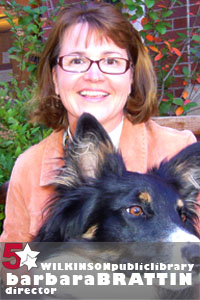
22 Jun BARB BRATTIN’S FIVE STARS: CONNECTING FOR COMMUNITY
Editor’s note: In 2011, for the fourth time in a row (and running), the Library Journal Index of Public Library Services, a public library rating system, designated Telluride’s Library a five-star institution. The Wilkinson Public Library ranked fifth in the nation among public libraries with annual budgets of $1 – 5 million, hence the name of library director Barb Brattin’s semi-regular column.
 Cincinnati is an old city. Its buildings are tired and worn, looming low along the Ohio River like stooped old men with centuries of stories to tell. Thick humidity and heat hang over tree-lined streets. Sirens fill the night. Broken hearts, Peter Block calls them, music of the inner city reminding us all is not right. Peter and his friend John McKnight have devoted their lives to building community as a weapon against poverty, crime and hopelessness. “Poverty in not the lack of money,” says McKnight. “Poverty is an absence of hope.”
Cincinnati is an old city. Its buildings are tired and worn, looming low along the Ohio River like stooped old men with centuries of stories to tell. Thick humidity and heat hang over tree-lined streets. Sirens fill the night. Broken hearts, Peter Block calls them, music of the inner city reminding us all is not right. Peter and his friend John McKnight have devoted their lives to building community as a weapon against poverty, crime and hopelessness. “Poverty in not the lack of money,” says McKnight. “Poverty is an absence of hope.”
A month or so ago, I participated in a two-day gathering themed “Connecting 4 Community.” Peter Block and John McKnight, two octogenarians, drew me there to learn about restoring community. That’s the topic I have chosen for the Risk and Reward Conference we at the Wilkinson Public Library are hosting in September in Telluride. I have asked McKnight to teach us how libraries can build what he calls “Abundant Community.”
Peter began by breaking us up into small groups. I asked the woman across from me what she has been working on. Early literacy, she said. I sat taller. “So you’re working with libraries!” She looked at me blankly: “Never thought of it,” she responded. My shoulders sagged. “That’s what we do,” I added in a tone of bewilderment. Later at lunch, Peter Kostenbaum challenged me. “Libraries are part of the evil empire,” he said. “A library is a repository of books.” I dropped my fork. “Not at all,” I said, shaking my head. “Libraries are the keepers of the human story in all its forms. The human story is essential to our psyche. There is no more important work.” He smiled and returned to his meal.
I went to Cincinnati as a missionary of sorts, carrying a message I know in my heart to be true: Libraries build abundant community. I expected to spend two days connecting with people who would expound on their collaborations with libraries. What I found was one hundred social service agencies, each working in a vacuum, almost smug in their self congratulation on being so damn enlightened, yet frustrated about their lack of progress in building the great society. And me, the only librarian in the room.
I remember leaning towards the window and peering out onto the city streets, desperate for fresh air and any sign of wildlife. After just two days, I had had enough of concrete and sirens. The trees outside were lush green, a color I was craving, and urban birds twittered on their branches. I leaned a little closer to hear their calls. Across the street was a long red brick building spanning two city blocks and standing three stories high with windows from ceiling to floor that shined their light on Cincinnati all hours of the day. An enclosed courtyard blooming green and pink and red was filled with laughing children. I remember a huge fountain out front and curved benches lining the outside walls filled with people of every race, age and socioeconomic status. People were talking with each other, catching water from the fountain with outstretched fingers. The doors of the building swung open every few seconds with no gatekeeper in sight. Everyone appeared to be welcome.
It was the library, the Public Library of Cincinnati and Hamilton County. I smiled to myself. I went to Cincinnati to hear how to build abundant community. Like the purloined letter, what I had been looking for was right in front of my eyes, right outside my window the whole time.


Sorry, the comment form is closed at this time.